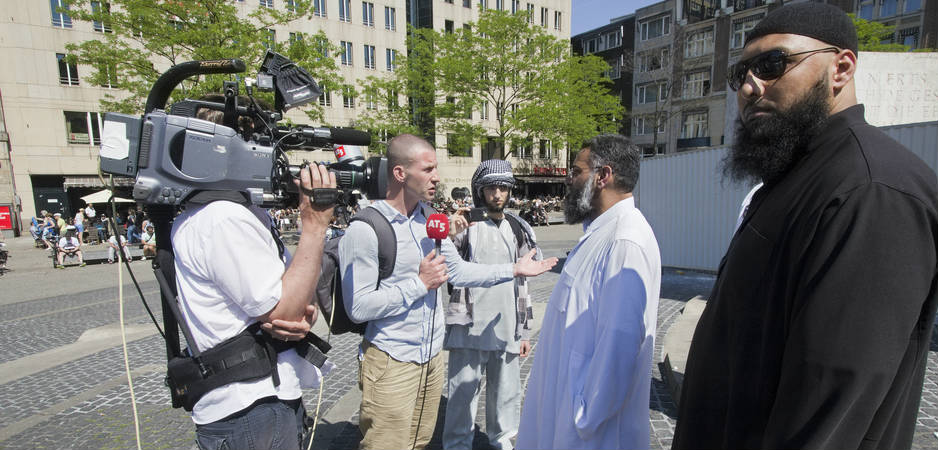Why are British Muslims so well-represented in the self-declared “Islamic State”?
The United States and Britain have similar-sized Muslim minorities, but US officials have estimated that approximately 100 Americans are fighting with the Islamic State, while their British counterparts put the number at 500 Britons; although Member of Parliament Khalid Mahmood estimates more than 1,500.
These extremists do not represent British Muslims, but British jihadists are British Muslims, so the government is right to acknowledge a wider problem of integration. Immigrant communities tend to be more religious, identify with their religious or ethnic group more than with Britons in general, and are more socially conservative — particularly on gender and sexuality. The chances of extremism increase in second-generation immigrants (the children of immigrants), whose identity is neither completely immigrant, nor British. Across different surveys, around 40% of British Muslims would prefer to live under sharia law, about one-third support killing in the name of Islam and 20% sympathize with suicide bombers.
Religion and Politics
The British government has no official explanation for the high incidence of British jihadists. It is also short of data. Immigration, residency and emigration remain highly undocumented due to European obligations, continuing incapacity at the Border Agency and political correctness. Moreover, the Home Office, and hence all law enforcement authorities, refuse to collect data on the religion or race of perpetrators of crimes. This conveniently avoids controversy about demographic profiling, but also prevents proper scaling of the problem and proper research into solutions.
The government has long held a strategy for engaging with at-risk groups, but this was spoilt by the administration of Tony Blair, which engaged with a handful of British Islamic organizations that — by being political — do not fully represent British Muslims, most of whom properly separate their religion from politics. One of these is the Muslim Council of Britain, which has criticized the current government for ignoring it over the last few years. But this organization should restrict itself to its constituted missions of faith and charity.
The same goes for Britain’s other religions, which have been encouraged into hypocritical politics. For instance, the Church of England’s leader, Archbishop of Canterbury Justin Welby, has written to British Prime Minister David Cameron about a lack of “a coherent or comprehensive approach to Islamist extremism.” But in 2008, Welby’s predecessor, Rowan Williams, had assented to sharia law and other religious encroachments.
Blair has used American photojournalist James Foley’s beheading to urge the West to strengthen its military intervention in the Middle East, but he — when prime minister — did not fight jihadism; he fought Saddam Hussein, who led a stable, secular Iraq until foreign occupation and democratization produced a sectarian society and an incapable state.
Then there is the intellectual poverty of fashionable hand-wringing about “disaffected” Muslims, followed by encouragement of more “engagement.” At best, this is well-intentioned empathy; at worst, it is an attempt to create official demand for hand-wringers themselves to “engage” with the disaffected — either way, it lacks cogency.
How legitimately disaffected can any minority be in a secular liberal democracy that has denied a majority culture in pursuit of multiculturalism? Hand-wringing about disaffection usually goes nowhere except to blame society and urge engagement, but this is encouraging unintegrated minorities to develop a culture of victimhood. Raising alarm about “disaffection” is partly a self-fulfilling prophecy.
Britain has denied its national identity and indulged multiculturalism in the seductive expectation of cultural homogenization. Democracy and multiculturalism can accommodate genuine grievances, but jihadists tolerate neither a secular majority, nor equality with other cultures. Countering extremism is impossible when multiculturalism treats every culture as equally valuable, including extremist ones.
A society should be secular before it is democratic. Hasty democratization and abandonment of secularists have left us with increasingly sectarian failed states, including most of sub-Saharan Africa, Libya, Syria, Iraq and Afghanistan.
Blair has used American photojournalist James Foley’s beheading to urge the West to strengthen its military intervention in the Middle East, but he — when prime minister — did not fight jihadism; he fought Saddam Hussein, who led a stable, secular Iraq until foreign occupation and democratization produced a sectarian society and an incapable state.
At home, Blair’s foreign wars and domestic legislation provided new grievances during a period of peak immigration and self-segregation. His attempts to counter extremism without promoting secularism backfired. (Blair himself became more religious while in office.) A rash of “antiterrorism” legislation in the 2000s left us with new crimes such as “religious hatred,” which actually protect religion from criticism.
The government’s dominant response to extremist activities is to ban whichever group can be associated with them, but membership of a group is a false crime (mere membership harms no one). Criminalizing a group is contrary to freedom of assembly, makes the tracking of suspects more difficult for intelligence services, and plays into the hands of radicals who claim that democracies are ultimately hypocritical and that jihadists are aggrieved, not prejudiced.
Countering Domestic Extremism
The real solutions to domestic jihadism must reward secularism and punish extremism — or at least keep it outside the borders. Hand-wringing will not achieve these aims. To be effective, Britain’s response must be more judicial than rhetorical, in the following six directions.
First, the British government should keep religious groups out of politics, promote religion as a private activity and separate religion from public services. For a start, sharia law should be tolerated no longer. Religious law and common law are fundamentally incompatible in a secular society. For instance, clerics who issue divorces are interfering in official business. In addition, the government should prohibit the use of public resources to support religious activities. This should be aimed at local authorities and schools, which have been scandalized by fundamentalist takeovers in recent years. Most urgently, the government should stop religious “free schools” — schools free from direct official management — which currently account for most free schools. It should also stop foreign governments, including those in Saudi Arabia and Qatar, from using their vast wealth to direct the development of Islam in Britain.
Second, the British government should constrain fundamentalist lifestyles that clash with social responsibilities. People who are too pious or busy protesting to work should not be drawing benefits such as Job Seekers Allowance.
Third, Britain should enforce its longstanding but long-neglected laws against the incitement of violence, threatening behavior and disturbing the peace, without de-policing whenever the perpetrators represent minorities. For decades, we have been embarrassed by images of the police protecting the rights of protesters with legends such as “Behead those who insult Islam,” while arresting counter-protesters.
Fourth, Britain should make use of the law against treason, which has not been used to prosecute since 1946; although it has been threatened against a few British jihadists since 2001 without a single indictment.
Fifth, the British Parliament should legislate against anti-constitutional activities. Some parts of Britain’s constitution are vague, but no doubt it is secular, liberal and democratic. Britons who campaign against any of these things should be more easily prosecutable.
Finally, Britain needs to overcome the simplistic primacy of human rights over public security, which allows those who make explicit threats to Britons to be protected from extradition or rescission of citizenship. For Britain to regain sovereignty over its laws and borders, it would need to renegotiate some of its obligations to Europe, but it already has rights to do so in the interests of public security.
The views expressed in this article are the author’s own and do not necessarily reflect Fair Observer’s editorial policy.
Support Fair Observer
We rely on your support for our independence, diversity and quality.
For more than 10 years, Fair Observer has been free, fair and independent. No billionaire owns us, no advertisers control us. We are a reader-supported nonprofit. Unlike many other publications, we keep our content free for readers regardless of where they live or whether they can afford to pay. We have no paywalls and no ads.
In the post-truth era of fake news, echo chambers and filter bubbles, we publish a plurality of perspectives from around the world. Anyone can publish with us, but everyone goes through a rigorous editorial process. So, you get fact-checked, well-reasoned content instead of noise.
We publish 2,500+ voices from 90+ countries. We also conduct education and training programs
on subjects ranging from digital media and journalism to writing and critical thinking. This
doesn’t come cheap. Servers, editors, trainers and web developers cost
money.
Please consider supporting us on a regular basis as a recurring donor or a
sustaining member.
Will you support FO’s journalism?
We rely on your support for our independence, diversity and quality.







Comment